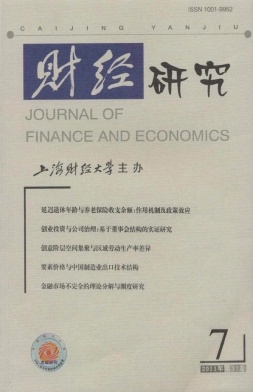上市公司股权激励与会计政策选择:基于资产减值会计的分析
财经研究 2011 年 第 37 卷第 07 期, 页码:61 - 71
摘要
参考文献
摘要
文章基于资产减值会计的视角,研究股权激励计划对公司会计政策选择的影响。我们发现:从盈余管理动机的角度看,股权激励影响公司会计政策的选择。在股权激励方案推出前后,实施股权激励计划的公司管理层基于自身利益的考虑,利用资产减值政策操纵会计盈余影响股权激励的行权条件。研究表明,部分实施股权激励计划的公司管理层利用资产减值政策操纵会计盈余推动股权激励方案的顺利实施,为自己谋利。文章的研究为上市公司盈余管理动机提供了新的分析视角,也为监管层进一步完善会计监管和股权激励制度提供了有益参考。
[1]王克敏,王志超.高管控制权、报酬与盈余管理——基于中国上市公司的实证研究[J].管理世界,2007,(7):111-119.
[2]吕长江,郑慧莲,严明珠,等.上市公司股权激励制度设计:是激励还是福利?[J].管理世界,2009,(9):133-147.
[3]戴德明,毛新述,邓璠.中国亏损上市公司资产减值准备计提行为研究[J].财经研究,2005,(7):71-82.
[4]王建新.公司治理结构、盈余管理动机与长期资产减值转回——基于我国上市公司的经验证据[J].会计研究,2007,(5):60-66.
[5]代冰彬,陆正飞,张然.资产减值:稳健性还是盈余管理[J].会计研究,2007,(12):35-42.
[6]刘玉廷,戴德明.资产减值会计——会计准则研究文库[M].大连:大连出版社,2005.
[7]谭燕.资产减值准备与非经常性损益披露管制[J].管理世界,2008,(11):129-142.
[8]肖淑芳,张晨宇,张超,等.股权激励计划公告前的盈余管理——来自中国上市公司的经验证据[J].2009,南开管理评论,(4):113-119.
[9]Chen C,J S Chen,X Su,et al.Incentives for and consequences of initial voluntary assetwrite-downs in the emerging Chinese market[J].Journal of International Accounting Re-search,2004,3(1):43-61.
[10]Bartov E,Mohanram P.Private information,earnings manipulations,and executivestock-option exercises[J].The Accounting Review,2004,79(4):889-920.
[11]Hagerman Robert L,Zmijewski Mark E.Some economic determinants of accountingpolicy choice[J].Journal of Accounting&Economics,1979,1(2):141-161.
[12]McNichols M,P G Wilson.Evidence of earnings management from the provision forbad debts[J].Journal of Accounting Research,1988,26,1-31.
[13]Stulz R M.Managerial control of voting rights:Financing policies and the market forcorporate control[J].Journal of Financial Economics,1988,20:25-54.
[14]Schipper K.Commentary on earnings management[J].Accounting Horizons,1989,3(4):91-102.
[15]Warfield Terry D,Cheng Qiang.Equity incentives and earnings management[J].TheAccounting Review,2005,80(2):441-476.
[16]Yermack D.Good timing:CEO stock option awards and company news announcements[J].The Journal of Finance,1997,52:449-476.
[17]Zucca L,Campbell D.A closer look at discretionary write downs of impaired assets[J].Accounting Horizons,1992,(6):30-41.
[18]Smith Jr,Clifford W,Watts Ross L.Incentive and tax effects of executive compensationplans[J].Australian Journal of Management,1982,7(2):139-157.
[2]吕长江,郑慧莲,严明珠,等.上市公司股权激励制度设计:是激励还是福利?[J].管理世界,2009,(9):133-147.
[3]戴德明,毛新述,邓璠.中国亏损上市公司资产减值准备计提行为研究[J].财经研究,2005,(7):71-82.
[4]王建新.公司治理结构、盈余管理动机与长期资产减值转回——基于我国上市公司的经验证据[J].会计研究,2007,(5):60-66.
[5]代冰彬,陆正飞,张然.资产减值:稳健性还是盈余管理[J].会计研究,2007,(12):35-42.
[6]刘玉廷,戴德明.资产减值会计——会计准则研究文库[M].大连:大连出版社,2005.
[7]谭燕.资产减值准备与非经常性损益披露管制[J].管理世界,2008,(11):129-142.
[8]肖淑芳,张晨宇,张超,等.股权激励计划公告前的盈余管理——来自中国上市公司的经验证据[J].2009,南开管理评论,(4):113-119.
[9]Chen C,J S Chen,X Su,et al.Incentives for and consequences of initial voluntary assetwrite-downs in the emerging Chinese market[J].Journal of International Accounting Re-search,2004,3(1):43-61.
[10]Bartov E,Mohanram P.Private information,earnings manipulations,and executivestock-option exercises[J].The Accounting Review,2004,79(4):889-920.
[11]Hagerman Robert L,Zmijewski Mark E.Some economic determinants of accountingpolicy choice[J].Journal of Accounting&Economics,1979,1(2):141-161.
[12]McNichols M,P G Wilson.Evidence of earnings management from the provision forbad debts[J].Journal of Accounting Research,1988,26,1-31.
[13]Stulz R M.Managerial control of voting rights:Financing policies and the market forcorporate control[J].Journal of Financial Economics,1988,20:25-54.
[14]Schipper K.Commentary on earnings management[J].Accounting Horizons,1989,3(4):91-102.
[15]Warfield Terry D,Cheng Qiang.Equity incentives and earnings management[J].TheAccounting Review,2005,80(2):441-476.
[16]Yermack D.Good timing:CEO stock option awards and company news announcements[J].The Journal of Finance,1997,52:449-476.
[17]Zucca L,Campbell D.A closer look at discretionary write downs of impaired assets[J].Accounting Horizons,1992,(6):30-41.
[18]Smith Jr,Clifford W,Watts Ross L.Incentive and tax effects of executive compensationplans[J].Australian Journal of Management,1982,7(2):139-157.
引用本文
张海平, 吕长江. 上市公司股权激励与会计政策选择:基于资产减值会计的分析[J]. 财经研究, 2011, 37(7): 61–71.
导出参考文献,格式为:
下一篇:国际收支约束与中国经济增长





 8544
8544  5174
5174

